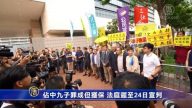【新唐人2014年10月16日讯】香港“占领中环”行动已持续两个多星期。路透社引述3名接近中共高层的消息人士透露,北京担心,香港的抗争行动会在大陆引发骨牌效应。北京当局认为,过去已经对香港作出足够多的让步,因此决定对占中“坚决不退让”。如果出现大范围混乱时,可能会动用中共军队。
香港当地时间10月15号凌晨3点,数百警察手持盾牌,在特首办外的龙和道,驱散那里的抗议者。双方爆发激烈冲突。
而就在14号,路透社引述了3位接近中共领导层的消息人士透露,中共国家主席习近平在10月的第一个星期,主持了中共国家安全委员会会议,希望尽快结束占中危机。
消息人士表示,北京当局认为已经“忍够”了香港的抗议行动,普选是主权问题,不会作出第三次退让。这些人士说,中共认为以往已经有过两次就香港示威活动的退让,包括2003年撤回《基本法》23条立法,以及2012年的反国民教育科示威。
“中国民主党全委会美国委员会”主席张健:“中共所谓的前面两次退让,它其实是缓兵之计,来调和中央政府和香港市民、和香港政府之间这样一个三角恋的关系。在这一次活动当中,民主运动发生之后,中共坚决要和香港爱好民主和平的市民死磕,这就暴露出中共残暴的统治性。”
其中一位熟悉北京对香港政策的消息人士表示:再退一步,中共就会溃坝。而且可能产生骨牌效应,西藏、新疆和大陆其他地方,都会要求选举权利。
美国纽约城市大学政治学教授夏明:“如果今天它在香港上让步,那么香港代表了这种普世价值,代表了公民社会,也代表了西方其他的影响。从某种程度上来说,香港可能会成为中国的宪政突破。那么会带来选举上,如果抗争,到获得成就的话,可能会对内地产生很大的影响。”
报导说,北京方面评估,香港的抗议持续,只会是香港的损失,而非大陆。受苦的只是香港人民。
“中国民主党全委会美国委员会”主席张健认为,这种说法,更证明了中共的不打自招。
张健:“香港就是中国的一部分,香港的损失就应该是中国的损失,香港的民主法制倒退就应该是中国的民主法制倒退。如果说一个地方产生了这一个极端问题的时候,中央政府却用这种说,是你自己的损失,好像此事与我无关,完全都是你,你是咎由自取,那这个态度,中共就是在愚弄港人,愚弄全世界所有善良人民的眼睛和智慧。”
消息说,北京不会在香港血腥镇压抗议群众,并且认为出动军队是最后的办法,只会在混乱扩大,出现杀人、放火、抢劫时动用。
美国纽约城市大学政治学教授夏明观察分析,如果中共当局不让步,香港学生不会主动撤走,将来一定会爆发某种程度的街头冲突。而如果中共在香港作出强烈的、带有暴力性质的回应,那么它维持统治的成本将会非常高,统治者权力的丧失速度也会越来越快。
夏明:“中国的维稳费用已经超过了军费,也就是说中国政府面临着一个高额的成本,再进行一场对人民的内战。如果习近平现在继续想追加这种镇压成本的话,第一,它有一个极限,第二,中国的经济现在是在下滑,政府财政来源其实也在下滑。他的政策是没办法受到资源的支撑的。它反而会更多的刺激中国民间和国际社会的抵制、反抗。”
此外,一名消息人士还提到,中共对特首候选人的筛选这一底线不会改变。这名不愿透露姓名的消息人士说:“香港并不是中央政府最关切的问题。最关切的是经济。”
采访/朱智善 编辑/王子琦 后制/陈建铭
Reuters: China Won’t Cede to HK Protests
Hong Kong’s Occupy Central demonstrations
have lasted for more than two weeks.
Three sources with ties to the Chinese leadership told Reuters
that Beijing is worried that the protests will lead to a domino
effect in mainland China and that enough concession
has been given to the protesters.
Beijing leaders decided the central government would
“firmly not give in" to the protesters.
The military may be sent in if there were widespread chaos.
At 3:00 a.m. Hong Kong local time on Oct. 15,
hundreds of police armed with shields dispersed the protesters
outside the Chief Executive’s Office on Lung Wo Road.
The two sides broke out in an intense clash.
Reuters reported on Oct. 14 that three sources close to the
Communist Party leadership told them that Xi Jinping held
a meeting of the new National Security Commission
in the first week of October and wanted to end the crisis quickly.
The sources say the Chinese Communist Party (CCP) feels
it has compromised enough with Hong Kong;
“Universal suffrage is a sovereign issue.
The central government will not give in a third time."
The sources say China has yielded to demands
by Hong Kong twice already.
Once in 2003, when 500,000 people protested
the controversial Article 23, or sedition bill,
forcing Beijing to back off from passing it.
The other time was a rally in 2012, when 120,000 people
protested forced Beijing end plans to implement
a pro-CCP national education scheme in Hong Kong schools.
Zhang Jian, U.S. Committee of The Democratic Party of China
chairman: “The past two concessions were in fact the CCP’s
tactic to smooth out the relationship between Beijing,
the Hong Kong people and the Hong Kong government.
But in this movement of pro-democracy, the regime is
determined to fight against the peace and democracy
of Hong Kong.
The brutal ruling of the CCP is fully exposed."
The Reuters report quoted one of the CCP inside sources
who said, “(We) move back one step and the dam will burst."
The report says the insider continued,
saying that “if Beijing yielded, it could have a domino effect
with Tibet, Xinjiang and other parts of the mainland
demanding the right to elections.。
Xia Ming, Political Science professor at City University
of New York: “Hong Kong represents a set of universal values,
a civil society, and an influence of the West.
To a certain degree, it could bring a constitutional breakthrough
for China if it makes any concession to Hong Kong.
This could have a huge impact on the mainland
if the protest is achieving a progress in the election."
One of the sources told Reuters, “If the protests continue,
it would be Hong Kong’s loss, not the mainland’s.
Hong Kong people would suffer."
Zhang Jian says this statement
is more of a confession by the CCP than anything.
Zhang Jian: “Hong Kong is part of China, the loss of it
should be China’s loss, and a regression of Hong Kong’s
democracy and legal system is the regression of China.
When the central government claims the loss is only local,
not national, the attitude is one of telling Hong Kong people
that they deserve the loss.
It is an insult, and the CCP is trying to fool Hong Kongers
and all the good people in the world."
The Reuters report says, “However, China has decided there
will not be a bloody crackdown in Hong Kong, and sending in
the People’s Liberation Army would only happen
if there were widespread chaos, the second source said."
Professor Xia Ming analyzes that if the CCP won’t budge,
and Hong Kong students won’t take the initiative to withdraw;
some degree of clashes in the streets are bound to erupt.
Xia says if the CCP responds with strong violence,
the cost to maintain its rule will be very high,
and its ruling power will be gone even faster.
Xia Ming: “China’s stability maintenance costs have exceeded
the military budget.
The CCP is already facing a high cost for a civil war against
the people.
If Xi Jinping is stepping up on the repression, first, there is a
max limit in the cost, and second, China’s economy is now
in decline, the governmental finance is in fact declining.
His policies will have no supporting resources and will instead
meet with more resistance and face a boycott by the domestic
and international society."
The second source in the Reuters report says:
“The central government’s bottom line will not change,"
“Hong Kong is not high on the list
of the central government’s priorities",
“The economy is the top priority."
Interview/Zhu Zhishan Edit/Wang Ziqi Post-Production/Chen Jianming




















